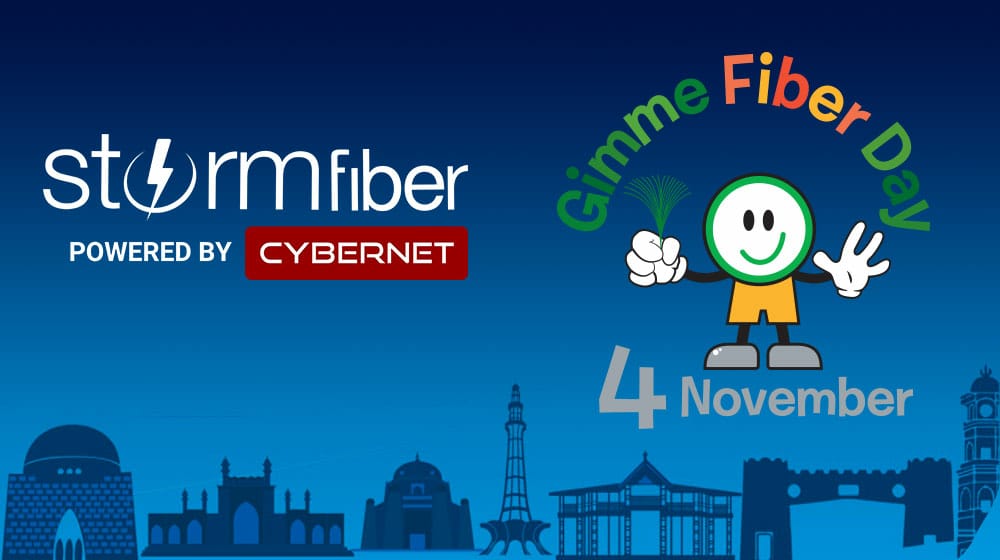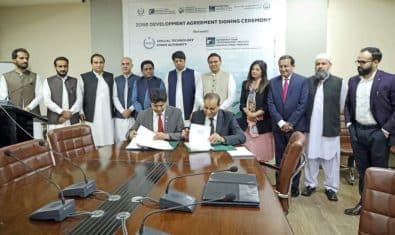StormFiber has collaborated with FTTH Council Asia Pacific to celebrate the annual “Gimme Fiber Day”. The day is celebrated on the 4th of November every year to showcase new ideas for broadband access solutions and acknowledge the positive impact of Fiber To The Home (FTTH) technology across the world.
What is Gimme Fiber Day?
The annual day was created in 2013 by the FTTH Council Global Alliance that includes the five FTTH Councils: Africa, Americas, APAC, Europe, and MENA. 4th November is the birthday of Nobel Prize winner Sir Charles Kuen Kao, the man who changed the way the world communicates and was awarded the 2009 Nobel Prize in Physics for groundbreaking achievements concerning the transmission of light in fiber-optic cables for optical communication.
This day recognizes the only future-proof broadband access solution i.e. FTTH and aims to reflect how it has positively impacted individuals and their communities across the world in terms of economy, society and quality of life. Fiber is considered to be the future of internet connectivity since it is the most reliable medium of communication, especially when compared with copper.
Data travels as light signals in fiber cables instead of electrical pulses and therefore the transmission speed is ultra-fast. Additionally, you can also get higher bandwidth with fiber connections due to high bandwidth support, unlike mobile broadband where the spectrum is limited.
Speaking on the occasion Fawad Yousuf Laher, Managing Director, StormFiber said:
FTTH is a technology that has been appreciated globally due to its sustenance and reliability. This technology advocates the idea of consistent service provisioning backed with state of the art infrastructure. However, Pakistan has still a long way to go as broadband subscription in FTTH is merely 0.1% and by PTA’s own record fixed-line penetration in aggregate is just 1.1%. The government must recognize the importance of fiber which forms the highways for carrying data and essential to the digitization of the country. In many ways, these digital highways are as important for the economy as transport highways – as they open access to global digital marketplaces where citizens can buy and sell digital goods and services. This can have an immense impact on the GDP and exports of any country.
About StormFiber
StormFiber is one of Pakistan’s largest fiber broadband services providers. It offers premium Triple Play Services (Internet, TV, and Phone) backed by its 100% Fiber-Optic Network. As a division of Cybernet, one of Pakistan’s oldest and last remaining Pakistani owned ISPs, StormFiber’s vision is to bring highly stable, ultra-fast broadband through fiber optic to the far reaches of Pakistan– so that citizens can experience the same standard of internet access as residents in London, New York or Beijing.
StormFiber has made significant investments to bring FTTH to the masses in a scalable way. Unlike most companies that target the most populous Pakistani cities for investment avenues, StormFiber has looked beyond and moved into the less populous cities like Hyderabad and Quetta.
Currently, the company is present in Karachi, Lahore, Faisalabad, Peshawar, Multan, Quetta and Hyderabad, where it employs over 1200 locals and thousands more through its fiber development contractors. The company plans to expand its fiber footprint nationwide by adding cities including Islamabad, Rawalpindi, Gujranwala, Sialkot, Sahiwal, Bahawalpur, Sargodha and many more.
Challenges for Fiber Broadband Penetration
As a fiber broadband service provider, StormFiber faces various challenges including the cumbersome right of way processes, a regressive tax regime consisting of a whopping 8% minimum tax on revenue which precludes claiming of depreciation, alternative corporate tax, advance income tax and provincial tax amongst others. It is important to note here that federal and provincial governments in Pakistan cumulatively levy an onerous 34% tax on fiber broadband.
In this effort, the role of the government is vital as ministerial and regulatory support encourages private companies to invest in technology infrastructure in the country to improve sustainability and have a positive social impact on the citizens of the country. A sustained governmental intervention here would immensely help ‘give fiber to everyone’.
In compendium, the spread of fiber broadband would result in a better-connected Pakistan. This would translate to an increase in GDP, an increase in overall tax collection, improvements in the standard of living, and will also empower vital facilities such as education, entrepreneurship and digital exports including software-related outsourcing which has immense potential to improve the current account deficit of the country.






















(1) the cumbersome right of way processes
(2) a regressive tax regime consisting of a whopping 8% minimum tax on revenue which precludes claiming of depreciation,
(3) alternative corporate tax,
(4) advance income tax and
(5) provincial tax amongst others.
It is important to note here that federal and provincial governments in Pakistan cumulatively levy an onerous 34% tax on fiber broadband.
Why doesn’t one of the so called ministers of Imran Khan cabinet just solve these issues? Maulana should protest on these points, it would do more for Pakistan than his other warped agenda.